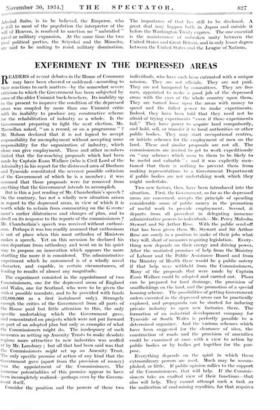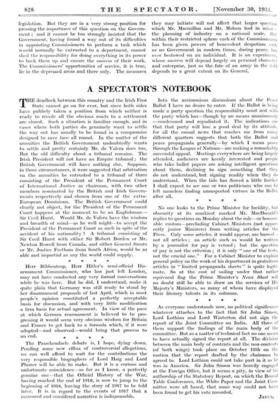EXPERIMENT IN THE DEPRESSED AREAS
READERS of recent debates in the House of Commons may have been cheered or saddened—according to their reactions to such matters—by the somewhat severe criticism to which the Government has been subjected by some of the.abler Unionit back-benchers. Its inability up to the present to improve the condition of the depressed areas was coupled by more than one Unionist critic with its inability to produce any constructive scheme for the rehabilitation of industry as a whole. Is the Government preparing to fight the next election, Mr. Macmillan asked, " on a record, or on a programme " ? Mr. Molson declared that it is not logical to accept responsibility for unemployment without accepting some responsibility for the organization of industry, which alone can give employment. These and other 'timbers hinted that the far-reaching proposals which had been made by Captain Euan Wallace (who is Civil Lord of the Admiralty) in his report for the distressed area of Durham and Tyneside constituted the severest possible criticism of the Government of which he is a member ; it was assumed that those proposals were far removed from anything that the Government intends to accomplish.
But is this a just reading of Mr. Chamberlain's speech ? On the contrary, hag not a wholly new situation arisen in regard to. the depressed areas, in view of which it is worth while to refrain from commenting on the Gavern- ment's earlier. dilatoriness and changes of plan, and to dwell on its response to the reports of the commissioners ? Mr. Chamberlain's speech was received without enthusi- asm. Perhaps it was too readily assumed that enthusiasm is out of place when this most orthodox of Ministers makes a speech. Yet on this . occasion he declared his own departure from orthodoxy and went on in his quiet way to propose an innovation which appears the more startling the more it is considered. The administrative experiment which he announced is of a wholly novel character, and capable, in certain circumstances, of leading to results of almost any magnitude.
The experiment consisted in the appointment of two Commissioners, one for the depressed areas of England and Wales, one for Scotland, who were to be given the widest possible mandate, and to be provided with funds (t2,000,000 as a first instalment only). Strangely enough the critics of the Government from all parts of the House paid but little attention to this, the only specific undertaking which the Government gave, and concentrated on projects which were not put forward as part of an adopted plan but only as examples of what the Commissioners might do. The inadequacy of such measures as setting up Amenity Trusts to make desolate regions more attractive to new industries was scoffed at by Mr. Lanslaury ; but all that had been said was that the COminissioners might set up an Amenity Trust. The only 'specific promise of action of any kind that the Government gave (apart. from the provision of money) was the appointment of the Commissioners. The immense potentialities of this promise appear to have been incompletely realized—perhaps even by the Govern- ment itself.
Consider the position and the powers of these two individuals, who have each been entrusted with a unique mission. They arc not officials. They are not paid. They are not hampered by committees. They are free men, appointed to make a good job of the depressed areas with the eyes of the whole country upon them. They are turned loose upon the areas with money to spend and the fullest pawer to make experiments. Indeed, they have been told that they need not be afraid of trying experiments "even if those experiments fail." They have power to acquire land compulsorily, and hold, sell, or transfer it to local authorities or other public bodies. They may start occupational centres, or initiate schemes for the employment of men on the land. These and similar proposals are not all. The commissioners are invited to get to work expeditiously on "any schemes which scent to them to be likely to be useful and valuable " ; and it was explicitly men- tioned that there is nothing to prevent them from making representations to a GovernMent Department if public bodies are not undertaking work which they might undertake.
Two new factors, then, have been introduced into the situation. First, the Government, so far as the depressed areas are concerned, accepts the principle of spending considerable sums of public money in the promotion of useful work to provide employment. Second, it departs from all precedent in delegating immense administrative powers to individuals—Mr. Percy Malcolm Stewart and Sir Arthur Rose. With the public send-off that has been given them Mr. Stewart and Sir Arthur Rose are surely in a position to make of their jobs what they will, short of measures requiring legislation. Every- thing now depends on their energy and driving power. After the unstinted promises of help from the Ministry of Labour and the Public Assistance Board and from the Ministry of Health there would be a. public outcry if that help were withheld from the Commissioners. Many of the proposals that were made by Captain Euan Wallace could be adopted and carried out. Plans can be prepared for land drainage, the provision of smallholdings on the land, and the promotion of a special housing scheme. The possibilities of getting Government orders executed in the depressed areas can be practically explored, and propaganda can he started for inducing private industry to open new factories there. The formation of an industrial development company for Tyneside or South Wales is perfectly possible to a determined organizer. And the various schemes which have been suggested for the clearance of sites, the construction of roads and the provision. of amenities could be examined at once with a view to action by public bodies or by bodies got together for the pur- pose. Everything depends on the spirit in which these extraordinary powers .are used. Much may be accom- plished, or little. If public opinion rallies to the support of the Commissioners, that will help. If the Commis- sionerS take an exalted view of their_ functions—that alSo will help. They cannot attempt such a task as the Unification of coal-mining royalties, for that requires legislation. But they are in a very strong position for pressing the importance of this question on the Govern- ment ; and it cannot be too strongly insisted that the Government, having found a way out of its difficulties in appointing Commissioners to perform a task which would normally be entrusted to a department, cannot shed the responsibility for doing everything in its power to back them up and ensure the success of their work. The Commissioners' opportunities of service, it is true, lie in the depressed areas and there only. The measures they may initiate will not affect that larger question which Mr. Macmillan and Mr. Molson had in mind— the planning of industry on a national scale. But within their restricted sphere each of the Commissioners has been given powers of benevolent despotism such as no Government in modern times, during peace, has ever bestowed on an individual. It is an experiment, whose success will depend largely on personal character and enterprise, just as the fate of an army in the field depends to a great extent on its General.











































 Previous page
Previous page